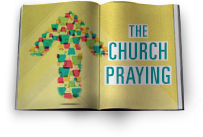How to Keep Your Scripted Prayers from Sounding Stiff and Robotic
Some people say you should never write out corporate prayers beforehand. It’s stifling the Spirit, they say. I disagree. The Spirit can work through my preparation on Saturday as much as he can work through my spontaneity on Sunday.
Still, no one wants to listen to a dry, dull speaker. The Lord will still listen but few others. We want our congregation to listen to congregational prayers. We want our people focused on God and praying with us. We want our prayers to build up the broken, wake up the unrepentant, and point to our hope in the gospel.
But we can’t expect this to occur if we’re doing our best Ben Stein impression during public prayer. Listening to the pastor’s prayer shouldn’t take more effort than rounding up the kids into the minivan before church. In fact, you can write them beforehand and read them in such a way that your congregation’s heart is warmed by your love for God’s name and pastoral concern for them.
BEFORE YOU WRITE THE PRAYER
Before you start typing away, pray for your church spontaneously. Pour out your heart before the Lord for the people he’s called you to shepherd. Do not stop to write anything down. Pray as you do every morning for the church. Celebrate God’s grace in the body. Thank God for answered prayers and pleasant surprises. Mourn sin. Empathize with their loss. Plead for grace. Feel for your people—their joys, their sorrows, their needs. If you want your scripted prayers to have heart, then you must first engage your own in the presence of God.
If you read Scripture in your service before the prayer, meditate and pray through that passage before you write your prayer. Let this passage influence the words you use and even the tone you might take. This will be instructive for the church. You’re teaching them to connect the passage they just read with the prayer that follows.
Think back over the past month. What was prayed for recently? Is there a population in the church that hasn’t been prayed for in a while—children, the elderly, stay-at-home moms, public school teachers?
Also consider different angles on issues. Are there perspectives you haven’t considered lately? For example, we often—and should—pray for the healing of sick members. Perhaps this week, though, you can pray for perseverance amidst physical trial. Or, if you typically pray for jobs for the unemployed, perhaps this week pray for contentment.
Praying for different populations and considering different angles will keep your scripted prayers from becoming tedious and repetitive. It will also minister to the body in fresh ways.
WHEN YOU WRITE THE PRAYER
As you begin writing your prayer, bring the pastoral heart and passion from your spontaneous prayers to the Word doc.
A man in my church came up to me one Sunday and said, “I can tell you aren’t writing your prayers anymore. This Sunday sounded like you.” He was wrong; I was still writing out my prayers, but I’d finally started to write for the ear. There’s no shame in reading scripted prayers, but generally speaking the congregation shouldn’t be able to tell. So be sure to write for the ear, not the eye. After all, they’re listening, not reading. Don’t worry about perfect grammar. Write in everyday English. Don’t be afraid of the occasional idiom. Drop the excessive use of conjunctions. How do you normally sound when you pray for them? Write with that voice.
Here are a few other pointers:
Write also for the heart, not only for the head.
I’m not advocating emotional manipulation, but we should use language that communicates passion and tenderness. When you read Paul’s prayers, notice how they drip with affection for Christ and his church. He says to the Philippians, “I hold you in my heart” and “I yearn for you all with the affection of Christ Jesus” (Phil. 1:7-8). He says to the Thessalonians, “We ought always to give thanks to God for you, brothers, as is right, because your faith is growing abundantly” (2 Thess. 1:3). Genuine affection in your prayer will make it easier to listen and harder to be distracted.
Remember you’re in a church and not a seminary classroom.
This is not the time to impress with four-syllable words or theological jargon. Save your discussion on penal substitutionary atonement for the sermon.
Be sure to name names.
Pray for Sister Johnson as she grieves the loss of her husband. Pray for Brother Phillip’s Bible study at the local sober house. The more personal the communication, the more people tend to listen.
Keep it current and make it global.
What’s going on around the world? We don’t want to unintentionally turn the God of the universe into a tiny village God who’s only aware of and concerned for our tiny pocket of the globe. I write my prayer on Saturday evening so that I can keep it current. I check local, national, and global news for disaster and tragedy. I don’t pray for something each time, but if there’s something significant I want to know about it. Also, what’s going on around your church? It’s rather embarrassing and unkind when you forget to pray for the family who just lost someone yesterday.
As you write your prayer, remember you’re modeling for your congregation both how to pray and what to pray for. Whether you use the Lord’s Prayer as a model or your favorite prayer acronym, model rich, coherent prayers that are saturated with God’s Word and informed by God’s purposes. Put some thought into the flow of the prayer. Dad is always more methodical and careful when Junior is watching—because he wants to instruct him.
WHEN YOU READ THE PRAYER
When you read the prayer, be mindful of three things: tone, pacing, and pauses. You might be tempted to check out mentally and simply read the words on the page. However, remember you’re not merely reading. You’re praying. If you simply go through the motions, your tone will not match what you’re praying for. I find that if I try to match my tone with the topic, I’m more engaged and don’t come off disconnected.
Make sure to also watch your pacing. People typically read faster than they speak. You have to slow down in order for people to follow what you’re saying. And take time to pause, especially after you’ve prayed for something significant.
Watching your tone, pacing, and pauses will keep you from sounding robotic and stiff.
* * * * *
Editor’s note: For a similar article, read Brian Davis’ “How to Keep Your Spontaneous Prayers from Sounding Aimless and Shallow.”








